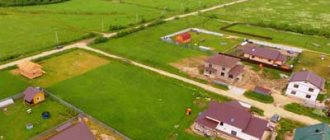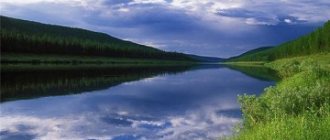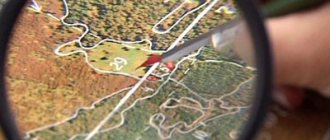Reserve lands are a legal definition of territories that do not have a designated purpose and are in reserve.
These plots can be located in any part of the country in which no one has acquired or used them. There are quite a few such lands in sparsely populated and undeveloped regions of Siberia and the Far East. The soil quality of the reserve lands varies .
With the correct calculation of the development prospects of the described areas, they become a profitable investment object. An increase in the area of cities leads to an increase in their prices.
ATTENTION! Contaminated and radioactively contaminated areas, as well as lands for some reason unsuitable for use in agriculture, are transferred to reserve lands.
The absence of documentary information about the classification of the territory into any category means that the site belongs to the reserve category.
Legislative acts
The procedure for disposing of, assigning categories and protecting reserve lands is prescribed in the legislation:
- Land Code;
- federal and regional regulations and laws.
In accordance with the regulatory framework, the use of plots of this type is strictly limited, transfer to private hands is impossible without assigning a category, and responsibility for their condition rests entirely with the entity on whose territory this plot is located.
Land protection measures
Protection of reserve areas is a set of actions aimed at preserving the quality of land, increasing their productivity and fertility. Measures to protect territories include:
- protection of land from erosion, flooding, swamping and other negative natural impacts;
- actions to preserve soils and their fertility;
- protection of farmland from overgrowing by weeds;
- elimination of the consequences of pollution, including man-made ones;
- development of legislative acts in the field of land protection.
For this purpose, federal, regional and local programs are being created, which include a list of mandatory measures to ensure the safety of sites, taking into account the characteristics of economic activity, natural and other conditions.
Assessment of the condition of the land and the effectiveness of conservation measures is carried out taking into account environmental assessment, sanitary, hygienic and other legislative requirements.
Detailed information is contained in “Legal protection of lands”.
What applies to reserve lands?
The list of territories not subject to transfer into private hands includes:
- located at a far distance from cities, villages, industries and agricultural lands;
- agricultural lands taken out of production due to depletion of their resources;
- reserved forest lands for the construction of industrial facilities;
- unusable reservoirs;
- forests that are currently unsuitable for use.
Land is the most important resource for the state, so it leaves part of the fund in reserve so that the development of space is not chaotic and unsupervised. The development of these territories is possible only in cases of extreme necessity.
List of territories
Their number is limited:
- Already existing reserve lands.
- Territories of populated areas.
- Areas containing communications, transport, industrial, space, defense and other facilities.
- Forest areas.
- Areas containing water bodies.
- Agricultural land.
The classifier of land use purposes provides a complete list of options for using plots for each category:
- Purpose of the buildings being erected.
- If the issue of gardening and dacha partnerships is being considered, then the rules for using the common territory and each plot separately are described.
Within the assigned category, the exploitation of land for one of the permitted types of use is allowed. No additional permission is required in this case.
Legal status
In accordance with the Land Code of the Russian Federation, reserve lands are prohibited from:
- transfer into private hands, both as property and as a lease for any period (Article 96);
- use the fields, forests and reservoirs located on the territory for industrial, agricultural and other needs;
- take any actions to the detriment of the territory and objects located on it.
Legislation allows:
- use of lands by citizens for personal non-industrial purposes: picking berries, mushrooms, fishing, hunting;
- you can be free on the territory, it is not classified as closed;
- it is possible to drive livestock through the reserve lands;
- collection of dead wood for heating a personal home, without harming trees, etc.
In addition, Article 45 of the Land Code of the Russian Federation allows:
- carry out geodetic and cadastral work on the territory;
- examine the soil for minerals;
- conduct training and research work.
In some cases, it is possible to create personal farms of citizens on reserve lands with the permission of the body in whose department the territory is located. Conditions for provision (Article 60 of the Land Code of the Russian Federation):
- the citizen is not a member of the collective farm;
- he does not work in an agricultural enterprise;
- he plans to organize a farm for personal purposes.
Use of land fund
Among the main users of land fund resources, in particular agricultural lands, are joint-stock partnerships and companies, farms and peasant farms, collective farms, including fishing enterprises. The listed users account for about half (52%) of all land classified as agricultural use. The second large group of land users are municipal and state entities, breeding farms and experimental production organizations; they account for 39.6% of all agricultural land.
Transfer to another category
Without assigning a category to a site, transfer to private hands on the basis of ownership or lease is impossible. Permission to develop land must be obtained; the violator faces administrative liability for unauthorized seizure of the territory.
The right to use the land is issued by the district administration responsible for the reserve land. When a plot has a specific purpose, it can only be used in accordance with cadastral information.
In what cases is it possible to change the category of reserve lands:
- a decision was made to create an object with a special status on the territory and make the territory closed: a national park, nature reserve, wildlife sanctuary, etc.;
- expansion of the boundaries of the municipality is required: increasing the territory of the city or village;
- it is necessary to build on the site an infrastructure facility for the life of citizens: a power plant, a water pumping station, power lines, roads, a water supply system, an oil pipeline, a medical or educational institution, etc.;
- At the expense of reserve lands, it is planned to strengthen state borders (the land is transferred for defense needs);
- It is planned to develop mineral deposits and extract them, for which it is necessary to build special facilities to facilitate this task.
Other purposes are not grounds for transferring reserve lands to any category.
But even if the goal is included in the listed points, the transfer may take a long time, and the initiator must collect all the justification for the procedure.
The main problems of redistribution of plots
Russia occupies a huge area, and the management of such a large number of territories is accompanied by problems in the field of land redistribution. The main difficulties include:
- Bureaucratization and a long period of time for changing the category of territory. This leads to delays in land development and may even create obstacles to the implementation of national projects.
- Encumbrance of easements on areas for which a change in purpose is planned.
- Lack of properly completed land documentation or its loss.
- The inability to transfer a territory to another category due to its condition: pollution, erosion, and so on.
What is required for translation
Regardless of how the territory is planned to be used and what category it is transferred to, the algorithm will be the same:
- Drawing up a request for transfer. It should reflect:
- the initiator's plans for land development;
- arguments in support of the idea;
- cadastral number of the required plot;
- its dimensions;
- the current category (reserve land) and the one to which the site needs to be transferred.
- Preparation of a package of documents:
- for individuals – passport;
- for legal entities - information about the legal entity from the Unified State Register;
- expert opinion from the environmental commission on the possibility of exploiting the land in the planned way;
- conclusion of a cadastral engineer on land surveying;
- plan of buildings on the territory, detailed description of each object.
- Submit documents and petition to the department to which the allotment belongs:
- for federal lands - the Government of the Russian Federation;
- for regional ones – the executive body of the subject;
- for municipal – local government bodies.
Submission of documents is carried out in two copies, on one of them the receiving party puts down the incoming number and date. This mark guarantees that the application will be considered during a special inspection.
- Wait for the decision:
- positive - in the form of a Resolution on assigning a special category to land;
- negative – an act of refusal. It can be appealed in court.
Grounds for refusal may be:
- the applicant does not have the right to receive land for use or the right to file a petition;
- an incomplete package of documents prepared with errors or inaccurate information;
- the goal is not sufficiently reasoned, the applicant’s idea did not find support from the state;
- goals violate urban planning regulations: incorrectly chosen dimensions, development plans, lands are in a special status, etc.
Land fund management
The management of the country's land fund is carried out by government agencies, which are divided into two main subgroups depending on the level of competence:
- General competence - municipal or state institutions that solve the problems of regulating and managing land legal relations of a general order.
- Special competence – municipal or state institutions with a narrow range of powers. Such organizations are faced with solving problems related to a specific area of management, for example, maintaining the state land cadastre, monitoring, land management, etc.
Time and cost of obtaining a category for reserve lands
The decision-making procedure is divided into two stages.
The first is checking documents for authenticity and compliance with reality. The authorities take 30 calendar days to do this. If violations are found, the applicant receives a certificate of refusal. Papers that pass the verification successfully are sent further.
The second stage is consideration of the application on its merits and the issuance of a decision. Deadlines – 2 months for municipal plots and lands of constituent entities, 3 months – for federal lands.
Submitting a package of documents is free. You will have to pay for the preparatory stage: land surveying, conclusion of the environmental commission and other items.
State of the land fund
Russia is one of the most prosperous countries in terms of land resources. At the same time, the huge size of land areas suitable for economic activity is relatively small. Among the main problems of domestic land resources, experts cite the deterioration of soil fertility and the condition of agricultural lands. The top cover of the post is subject to regular pollution, as a result of which the land begins to degrade and loses the ability to reproduce fertility and restore properties.
Advice from Sravni.ru:
Land is one of the main resources of Russia. Until every person, every company realizes this truth, we will treat the land as a consumer, which ultimately will not bring profit either to the Russian Federation or to individual large landowners. The whole country needs to preserve and increase the beneficial properties of the land, and the problem of soil pollution and the lack of simple rules of the game in the land market needs to be solved at the state level, and the sooner the better.
Resolution of controversial issues
If controversial situations arise, it is better to seek help from a qualified lawyer. And also in case of disagreements with the local administration, you can go to court.
In addition to the Land Code of the Russian Federation, such issues are regulated by the Constitution of the Russian Federation, Federal Law dated December 21, 2004 No. 172-FZ and other by-laws.
If the soil is contaminated with radioactive or chemical waste without the fault of the landowner, it is possible through the court to obtain compensation for expenses and reimbursement of the cost of the plot.
Reserve land is a special reserve territory that cannot be exploited or transferred into the ownership of citizens until its intended purpose changes. After changing the type of permitted use, they can be used for their intended purpose.
What use is permissible?
Since reserve lands belong to a separate special category of lands, their exploitation must comply with strict principles that may prohibit or, conversely, allow the use of certain resources.
For example, it is permissible to exploit reserve lands without transferring them to another category if:
- The territory of the reserve lands is not part of a closed formation and people will have open access to all their resources. For example, citizens can freely pick berries or fish on such lands;
- The territory of the land will be used for hunting purposes or driving livestock to pasture, but without stopping there;
- The territory of the land is used for harvesting withered trees, but no cutting will be carried out. Such activities are permitted only if the dead wood will be used for heating certain types of housing, and also if the activity is not aimed at generating income.
In all other cases, the use of reserve territories is permitted after their transfer to another SGA category. If the exploitation of land does not occur in the listed situations, it may be prosecuted by law.










